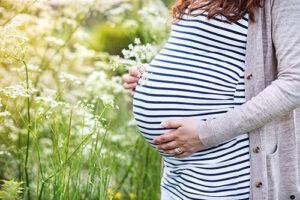Pregnant Domestic Violence Victims’ Rights to Include Unborn Babies in Restraining Orders in New Jersey
Restraining orders in New Jersey can protect not only the victim of domestic violence, but also their unborn child.

Until recent years, there was no way for a victim to protect her unborn child from her abuser besides applying for a restraining order after the child was born. Yet, it is easy to imagine the challenges that can come up in this situation. If the abuser is the child’s father, does he have a right to see the child in the hospital? If a mother and/or her new baby are battling medical complications after birth, must they also rush to court to apply for a restraining order?
While New Jersey does not recognize an unborn child as having independent rights, a New Jersey law has expanded protections to victims of domestic violence by allowing mothers to add their unborn children to an existing restraining order. The restraining order will only take effect with respect to the baby after the baby is born, but ensures that the protection applies to the child immediately. Of course, before the baby is born, the restraining order against the mother is effective in protecting the child in her womb, as the abuser is prohibited from physically approaching the mother.
Steps to Protect Your Unborn Child in NJ: Modifying a Restraining Order for Future Safety
To add an unborn child to a restraining order, the victim must first motion the court to modify the existing order. The victim will notify the court of her pregnancy, request that her unborn child be added to the restraining order, and provide evidence that the abuser, or individual against whom the restraining order has been issued, is a threat to the safety of the unborn child.
Acceptable evidence may include details of prior acts of violence against the victim or other children, threats against the child, or any other actions or statements that indicate the abuser could be a threat to the child after he or she is born. The court will consider all of the evidence and determine whether there is sufficient cause to include the unborn baby.
What Happens when You Include an Unborn Baby in a Restraining Order During Pregnancy in NJ?
Adding an unborn child to an existing restraining order can provide significant protection to both the mother and child. The restraining order will prevent the abuser from approaching or contacting the mother and the child after the child is born. In situations where the abuser is the child’s father or mother’s husband (legally presumed father), the restraining order can prevent him from visiting the child in the hospital. It also alleviates the mother from having to rush to court to obtain a restraining order for her newborn baby right after giving birth. This is a physically and emotionally vulnerable time for the mother and a medically vulnerable time for the child. Recovering from childbirth, particularly after a cesarean section or if any complications occurred during or after the birth, is an extreme hardship on the body. If the child is in need of extra medical care after birth, either in the NICU or from the mother, the need to rush to court can be extremely taxing on the child and woman.
Women who are victims of domestic violence are also much more likely to suffer from postpartum depression (PPD) at a rate of 3 to 5 times higher than moms who haven’t experienced abuse. Being forced to go to court immediately to pursue a restraining order for a newborn baby or navigating the postpartum season without a restraining order can worsen PPD. Proactively adding an unborn child to an existing restraining order can mitigate the risks associated with these situations and reduce the physical and emotional harm to the baby and mother during this vulnerable and critical time.
We Can Fight for Your Unborn Baby in a Restraining Order Case in New Jersey
Your current challenges are likely not how you imagined bringing a child into the world, but you don’t have to shoulder the burden alone. They say it takes a village to raise a child, and sometimes it takes a village to protect a mother and her child. The State of New Jersey recognizes the vulnerable position of pregnant mothers who are victims of domestic violence, and there are special procedural options available to help protect you and your baby from an abuser. If you are pregnant and a victim of domestic violence in New Jersey, please contact the skilled attorneys at The Tormey Law Firm today to discuss your options and the best ways to protect you and your child during your pregnancy and after the birth of your child.
If you do not already have a restraining order in place, our New Jersey restraining order lawyers can help you obtain one against your abuser. If you already have a restraining order and are pregnant, our dedicated attorneys can motion the court to add the child to your existing restraining order and provide the necessary evidence for your request.
On the other hand, if your pregnant former girlfriend, wife, or romantic counterpart is seeking a restraining order against you, the stakes are extremely high. The impact this could have on your ability to see and potentially have a relationship with your unborn child is catastrophic, necessitating immediate, strong defense to challenge the restraining order. Our attorneys handle cases like this on behalf of soon to be fathers in Atlantic City, Hoboken, Trenton, Princeton, Cape May, Newark, Jersey City, Paterson, Elizabeth, New Brunswick, and throughout the state. Contact us to discuss how to take action in protecting your innocence and find out more about how we can assist you. Call (908)-336-5008 for a free consultation.




